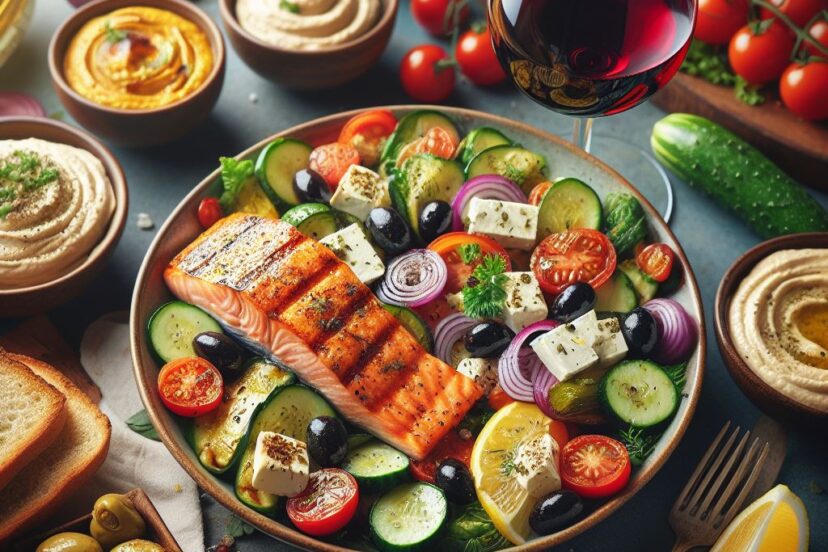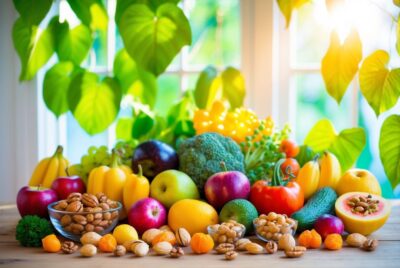Vegetarian Mediterranean Diet: Benefits and Meal Ideas
*We may earn a commission for purchases made using our links. Please see our disclosure to learn more.
Vegetarian Mediterranean Diet: Health Benefits and Meal Planning Tips
The vegetarian Mediterranean diet is an adaptation of the traditional Mediterranean diet, which is celebrated for its health benefits and focus on plant-based foods, whole grains, nuts, and healthy fats. As a vegetarian version, it excludes meat and fish but embraces a bounty of vegetables, fruits, legumes, nuts, seeds, and whole grains. It places an emphasis on fresh and whole foods, minimally processed ingredients, and meals rich in fiber, vitamins, and minerals. My approach incorporates the flavors and culinary traditions of the Mediterranean region while aligning with vegetarian principles.

Adopting this diet is not just about limiting certain foods; it’s about exploring a diverse range of nutritious and flavorful ingredients. I find that meals tend to be colorful, with a variety of textures and flavors that come from the use of herbs and spices native to the Mediterranean palette. Olive oil is a staple fat used for cooking and dressing foods, and there is a strong tradition of enjoying meals with others, placing an emphasis on the social aspect of dining.
The health benefits associated with this diet are substantial. Research has shown that the Mediterranean diet can support heart health, aid in weight management, and may even reduce the risk of certain chronic diseases. A vegetarian Mediterranean diet enhances these benefits by potentially lowering the intake of saturated fats and cholesterol while increasing fiber and nutrient-rich plant components in daily meals. My personal experience has shown me that this plant-centered approach to eating can be satisfying and enriching both to the palate and overall health.
Foundations of a Vegetarian Mediterranean Diet

Adopting a vegetarian Mediterranean diet involves focusing on nutrition-rich plant-based foods, whole grains, and the use of olive oil, which form the core of this dietary pattern. I’ll explore both the essential components of the diet and the health benefits it offers.
Key Components
The vegetarian Mediterranean diet is a plant-based eating plan that emphasizes the following:
- Whole grains: I incorporate a variety of whole grains like quinoa, farro, and whole-wheat bread as daily staples. These are rich in fiber and nutrients.
- Vegetables: A cornerstone of my diet, I eat an abundance of vegetables, both raw and cooked. Leafy greens, tomatoes, and bell peppers are frequent on my plate.
- Fruits: Fruits serve as my main desserts and snacks. Apples, oranges, and grapes are typical choices, enriching the diet with vitamins and natural sweetness.
- Olive oil: I use extra virgin olive oil liberally as my primary fat source, favoring its heart-healthy properties over saturated fats.
- Nuts and seeds: Almonds, walnuts, and flaxseeds are my go-to for healthy fats and proteins.
- Legumes: Protein intake is essential, so I include a variety of beans, lentils, and chickpeas in my meals.
Health Benefits
The health benefits of a vegetarian Mediterranean diet are well-documented, and I’ve experienced some of these myself:
- Heart health: The high intake of olive oil, nuts, and whole grains has been linked to reduced risk of heart disease.
- Weight management: Rich in fiber and low in processed foods, this diet helps with satiety and healthy weight maintenance.
- Reduced risk of chronic diseases: Studies suggest that a diet rich in plant-based foods can lead to lower risks of various chronic conditions, including Type 2 diabetes.
- Improved digestion: A diet high in fruits and vegetables supports healthy digestion due to its fiber content.
By focusing on these components and acknowledging the associated health benefits, I’ve made informed choices that align with a vegetarian Mediterranean diet, maintaining the pleasure of eating while prioritizing my health.
Diverse Ingredients and Flavors

I find that the heart of a Vegetarian Mediterranean diet lies in its rich tapestry of flavors and ingredients, which hinge on freshness and variety. Here, I’ll detail some staples as well as the herbs and spices that provide its distinctive zest.
Essential Ingredients for a Vegetarian Mediterranean Diet
Vegetables are central to my culinary creations, where eggplants, zucchini, peppers, and tomatoes offer a palette of flavors and textures. I frequently use olive oil as a flavorful and healthy fat, vital for salads and cooking. Beans and chickpeas are my go-to sources for protein; they’re filling and blend seamlessly with a myriad of dishes. Cheese, like feta, adds a salty touch, enhancing the overall taste profile. Grains such as quinoa and couscous often serve as the base for my meals, while fruits—from citrus like lemon to olives—provide a balance of sweet and sour notes. Here are a few favorites:
- Olive Oil: Golden and rich, it’s the cornerstone of my kitchen.
- Garlic & Onions: Aromatic essentials that bring depth to dishes.
- Leafy Greens & Cruciferous Vegetables: From romaine to broccoli, they’re key for nutrients and fiber.
- Legumes: Lentils, white beans, and peas are hearty and protein-rich.
- Seeds and Nuts: Including tahini and pine nuts for added flavor and texture.
- Fruits: I love adding slices of avocado or a handful of cherry tomatoes to my salads.
Vegetarian Mediterranean Diet: Herbs and Spices
Herbs such as basil, parsley, mint, cilantro, and oregano infuse my dishes with a freshness that percolates through every bite. Cumin, with its earthy warmth, is a spice I regularly reach for, especially in legume-based dishes. Tahini, a paste made from ground sesame seeds, is a go-to for adding nuttiness and creaminess, particularly in dressings and dips. Below, I’ve put together a quick reference:
- Basil: Aromatic and sweet, perfect in tomato-based recipes.
- Mint: Offers a cool, refreshing edge to salads and dips.
- Cumin: Earthy and slightly spicy, exceptional in grain dishes.
- Oregano: Pungent and bold, ideal for giving life to beans and vegetables.
- Parsley & Cilantro: I use these liberally for a burst of green and a crisp, clean finish.
In my experience, the Vegetarian Mediterranean diet is more than the sum of its parts—it’s an exploration of harmonious flavors that pay homage to tradition and foster healthful eating.
Meal Planning and Prep

In my approach to a Vegetarian Mediterranean diet, strategic meal planning and preparation are crucial. These steps ensure that my meals are not only nutritious and aligned with the diet’s principles but also that they fit seamlessly into my daily routine. Now, let’s break down what a typical day looks like across meals.
Breakfast Ideas
Prep Time: 5-15 minutes
Tools Needed: Pan, spatula, bowl
For breakfast, I aim for simplicity with a dose of protein and fiber to kickstart my day. A quick and satisfying idea is scrambled eggs with spinach, cooked in olive oil. I usually whisk the eggs with milk, add black pepper, and fold in fresh basil for extra flavor. Another option is a Mediterranean quinoa bowl with a sprinkle of feta cheese and chopped nuts.
Lunch Strategies
Prep Time: 10-20 minutes
Meal Prep Tips: Batch cook grains, utilize leftovers
Lunchtime is ideal for making the most of leftovers or prepped ingredients. I ensure my fridge has a selection of cooked grains like quinoa or farro, ready to be tossed with roasted vegetables or a hearty bean salad. Utilizing an Instant Pot can speed up the process for grains and legumes. My typical lunch might feature a chickpea stew I’ve prepped over the weekend.
Dinner Recipes
Prep Time: 15-30 minutes
Cooking Methods: Sautéing, simmering, baking
Dinners on a Vegetarian Mediterranean diet are diverse and flavorful. A favorite recipe of mine is the ribollita, a Tuscan soup brimming with beans, carrots, and kale. It’s even better the next day, making it perfect for batch cooking. I also experiment with stuffed bell peppers, filling them with rice, mushrooms, and herbs, then baking until tender.
Snacks and Sides
Prep Time: 5-10 minutes
Healthy Options: Nuts, fruits, yogurt, small salads
Snacks are an opportunity to keep energy levels stable between meals. My go-tos include Greek yogurt with a drizzle of honey and walnuts, or sliced cucumbers with hummus. I make it a point to prepare small side salads in advance, using a variety of fresh vegetables, olives, and a simple lemon-olive oil dressing to accompany my mains.
Special Dietary Considerations

When following a Vegetarian Mediterranean diet, it’s vital for me to acknowledge special dietary needs, such as allergies and food intolerances. I make sure to include nutrient-dense food options to maintain a balanced intake while respecting these considerations.
Allergies and Intolerances
Individuals with gluten intolerance or celiac disease can adapt Mediterranean vegetarian recipes to exclude gluten-containing grains. Options like quinoa and brown rice can serve as excellent alternatives. For those with lactose intolerance, plant-based milk and Greek yogurt alternatives can be used in meals, ensuring the necessary calcium intake without discomfort.
- Gluten-Free Grains: quinoa, brown rice, millet
- Dairy Alternatives: almond milk, lactose-free yogurt
In regards to food sensitivities, especially to nuts which are a staple in this diet for their healthy fats, I recommend seeds like chia or flaxseeds as alternatives. This ensures that I still receive essential fatty acids without triggering an allergic response.
Nutrient-Dense Options
I focus on incorporating a variety of legumes such as chickpeas, lentils, and black beans in my diet. These deliver a powerful combination of protein and fiber, essential for my muscle health and digestive wellness. In addition, I make sure to consume plenty of nuts—unless, of course, there’s an allergy—to provide healthy fats that are crucial for heart health.
Examples of Nutrient-Dense Foods:
| Food Type | Examples |
| Legumes | Chickpeas, lentils, black beans |
| Nuts & Seeds | Almonds, chia seeds, flaxseeds |
| Healthy Fats | Olive oil, avocados |
By carefully selecting ingredients and being mindful of specific dietary needs, I can enjoy a diverse and satisfying Vegetarian Mediterranean diet without compromising on nutrition or taste.
Culinary Inspiration and Recipe Ideas

Mediterranean cuisine is a treasure trove of vegetarian delights. I’m excited to share a selection of recipes that capture the essence of this diet, highlighting fresh ingredients, bold flavors, and simple preparations.
International Vegetarian Mediterranean Diet Recipes
The Mediterranean region spans several countries, each offering unique dishes. Italian cuisine presents the rich flavors of eggplant parmesan, adorned with layers of marinara sauce and mozzarella. In Greece, dishes like stuffed eggplant and feta cheese-laden salads are common. Meanwhile, Moroccan recipes often feature couscous or hummus, enhanced with spices like cumin and coriander. Spanish and Turkish influences bring vibrant tapas and accentuate the use of lemon juice and olive oil.
- Italian: Eggplant Parmesan with Marinara Sauce
- Greek: Feta Cheese Salad with Kalamata Olives
- Spanish: Tapas with Roasted Bell Peppers and Almonds
- Turkish: Hummus with Olive Oil Drizzle
- Moroccan: Spiced Couscous with Roasted Vegetables
Quick and Easy Options
When I need a meal on the table without fuss, I often turn to the Mediterranean diet for inspiration. Fast and fulfilling, dishes like a simple penne with bold tomato sauce or a quinoa salad with chunks of sweet potatoes and kale offer convenience without sacrificing flavor. Not to mention the versatility of pasta tosses with fresh basil and parmigiano to create a comforting meal in minutes.
- Quick Penne with Homemade Marinara Sauce
- Quinoa Salad with Sweet Potatoes and Kale
Seasonal Selections
Embracing the seasons allows me to use produce when it’s at its peak. In fall, a warm salad of roasted brussels sprouts and carrots is my go-to. The sweetness of winter’s sweet potatoes shines in hearty stews. Spring’s bounty brings dishes alive with lemon juice and tender kale, while summer’s ripe tomatoes are perfect for a light pasta dish or a colorful pizza topped with fresh bell peppers and mozzarella.
- Autumn: Roasted Brussels Sprouts and Carrot Salad
- Winter: Sweet Potato Stew with a Touch of Cumin
- Spring: Lemon-Kale Penne Pasta
- Summer: Tomato and Bell Pepper Pizza with Mozzarella
Discovering vegetarian recipes within the Mediterranean diet is not just satisfying; it’s an exploration of rich, colorful cuisine that brings joy to the table with every dish.
Frequently Asked Questions
In these FAQs, I’ll address common queries about incorporating high-protein foods into a Vegetarian Mediterranean diet, creating a weekly meal plan, identifying key ingredients, finding easy recipes, understanding the diet’s potential for weight loss, and the inclusion of peanut butter.
1. What are some high-protein vegetarian foods suitable for the Mediterranean diet?
In the Vegetarian Mediterranean diet, high-protein foods include legumes like lentils and chickpeas, nuts such as almonds, seeds like chia and hemp, as well as tofu and tempeh. Eggs and dairy products like Greek yogurt and cheese are also excellent sources of protein for vegetarians.
2. How can I create a 7-day vegetarian Mediterranean meal plan?
I can create a 7-day meal plan by including a variety of fruits, vegetables, whole grains, and protein sources. The key is to plan meals around plant-based proteins, healthy fats, and whole grains, ensuring a balanced intake of nutrients each day. Aiming for culinary diversity makes the diet enjoyable and sustainable.
3. What are typical ingredients included in a vegetarian Mediterranean diet food list?
Typical ingredients include an array of colorful fruits and vegetables, whole grains like quinoa and farro, legumes such as beans and lentils, nuts, seeds, herbs, spices, olive oil, and fermented dairy products like yogurt and cheese. These staples provide a rich nutrient profile aligned with a vegetarian Mediterranean diet.
4. Are there easy vegetarian recipes that follow Mediterranean diet guidelines?
Yes, countless easy vegetarian recipes comply with Mediterranean diet guidelines. These can range from simple dips like hummus to one-pot dishes such as vegetable paella. The emphasis is on fresh ingredients and minimal processing, ensuring that the recipes are both healthful and straightforward to prepare.
5. Is it possible to use a vegetarian Mediterranean diet for effective weight loss?
A vegetarian Mediterranean diet can contribute to weight loss if it creates a caloric deficit while maintaining balanced nutrition. High fiber and water content in vegetables and fruits, along with healthy fats and protein, can aid in satiety and manage caloric intake without the need for strict calorie counting.




